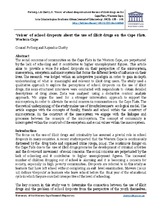‘Voices’ of school dropouts about the use of illicit drugs on the Cape Flats, Western Cape
Abstract
The social concerns of communities on the Cape Flats in the Western Cape, are perpetuated by the lack of schooling and it contributes to higher unemployment figures. This article aims to provide a voice for school dropouts on their perspective of the microsystem, mesosystem, exosystem and macrosystem that forms the different levels of influence on their lives. The research was lodged within an interpretive paradigm in order to gain in-depth understanding of what is meaningful and relevant to illicit drug users. The study used a qualitative approach to explore the perceptions of school dropouts on the use of illicit drugs. Six semi-structured interviews were conducted with respondents to obtain detailed descriptions of drug abuse. Data was analysed using a deductive content analysis approach. We argue the need for a stronger intervention approach to support the microsystem, in order to alleviate the social concern in communities on the Cape Flats. The theoretical underpinning of the study makes use of Bronfenbrenner’s ecological model. The article engages with the concepts of family, friends and school within the construct of microsystems. In the construct of the mesosystem we engage with the linkages and processes between the concepts of the microsystem. The concept of community is interrogated within the construct of the exosystem and social values within the macrosystem.

